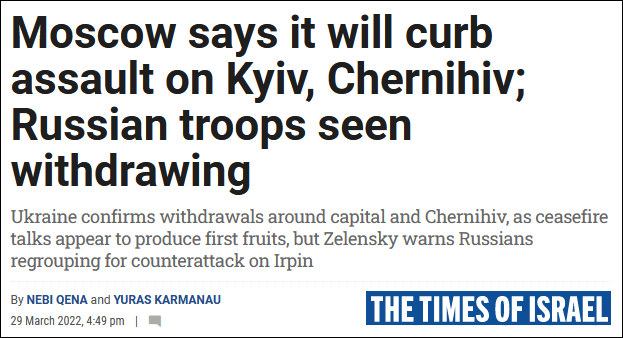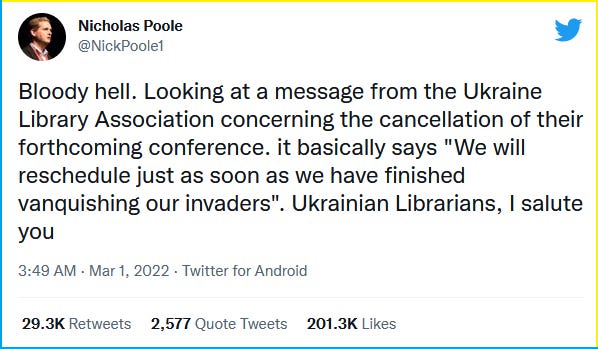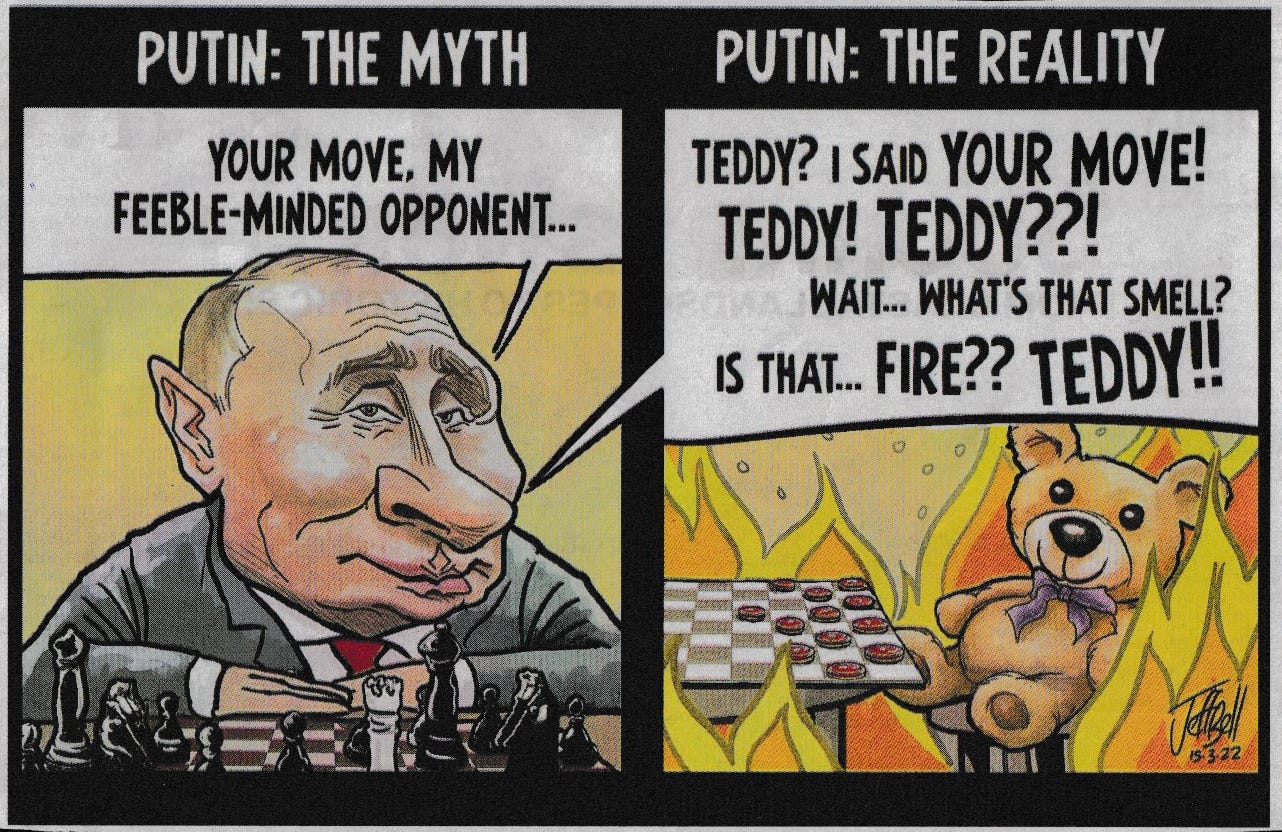Ukraine: what are we are missing? (4/wha)
The Big Question: Why?
Much has been made of "why" Russian invaded Ukraine. Each of the small army of pundits have their own ideas and theories.
But few - if any - have asked the Big Question: why have practically all the former Soviet bloc nations, plus several former Soviet Republics, rushed to join NATO - making it a security organisation with thirty member states.
Former Soviet bloc nations/Republics that have joined NATO:
Albania, April 2009
Bulgaria, March 2004
Croatia, April 2009
Czech Republic, March 1999
Estonia, March 2004
Hungary, March 1999
Latvia, March 2004
Lithuania, March 2004
Montenegro, June 2017
North Macedonia, March 2020
Poland, March 1999
Romania, March 2004
Slovakia, March 2004
Slovenia, March 2004
Former Soviet Republic , Georgia, is not yet a NATO member but negotiations are apparently on-going. In 2008, 75% voted in favour of NATO membership in a non-binding referendum.
The Big Question remains unasked and unanswered.
The answer, of course, is abundantly obvious. All of these nations have had first-hand experience of living within the Soviet sphere of influence. And while the Soviet Union may have vanished into history - Russia remains.
Just as the United States is viewed with suspicion in Latin America; and Western Nations - especially France, UK, and United States - are largely distrusted or even despised in the Middle East, Africa, and elsewhere:
Within days of the Russian invasion, Western countries invoked international law, imposed crippling sanctions, began welcoming refugees with open arms and cheered on Ukraine's armed resistance.
The response has elicited outrage across the Middle East, where many see a glaring double standard in how the West responds to international conflicts.
[...]
When Russia intervened in Syria's civil war on behalf of President Bashar Assad in 2015, helping his forces to pummel and starve entire cities into submission, there was international outrage but little action. Syrian refugees fleeing to Europe died on perilous sea voyages or were turned back as many branded them a threat to Western culture.
Imperialist powers tend not to make good friends when exercising hegemony around the world. Russia is no exception.
For those Hungarians who could remember the bloody uprising of 1956, and Czechoslovakians crushing of the "Prague Spring" of 1968, there could be no possible alternative.
Few people in the West have had direct experience of living within the Soviet "sphere of influence". For Westerners, their (mostly) affluent, consumerist, squabbling, messy, pluralist society was worlds away from their regimented neighbours to the East.
So when the Soviet Union collapsed, these nations exploited the momentary lapse of Russian hegemony, and rushed to embrace the only security organisation that could offer protection: NATO.
Western critics of "NATO expansionism" ignore recent historical reality that, simply put, Russia was (and still remains) a bad neighbour. Especially when those same Western critics do so in luxury, a very safe distance from the Russian border.
The question is not "Why" - but "Why wouldn't they?"
Meanwhile, back in Russia...
The utter failure of Russia to overwhelm and defeat the Ukrainian army may have left Russian generals not just frustrated but fearful. The entire world has just 'enjoyed' a ring-side, front row, seat watching the much-vaunted Russian army grind to a halt in the face of a much "weaker" neighbour.
It may be a nuclear power but atomic bombs are not much use in conventional war theatres.
This is not a "good look" for Russia. It has shown the world it is a third-rate power with poorly trained; unmotivated; and badly resourced troops. It has relied on air power and cruise missile from distant warships in the Black Sea and (supposedly) mercenaries from Syria and Chechniya.
Despite their efforts, Ukrainians have demonstrated - yet again - that superior firepower does not always win against human determination. The United States lost in Vietnam; and both the Soviet Union/Russia and United States took turns losing in Afghanistan.
Russian generals will be squirming as the glare of an international spotlight is thrust upon them. NATO is watching, learning, and understanding. The secret is out: the Russian "bear" is apparently not as ferocious as it makes out.
These are not the headlines Russian generals ever wanted to see:
Putin will not be happy with his Generals The generals will not be happy with Putin. Russians will not be happy with Putin or the Generals.
Ructions in Russia
Christo Grozev, writing for Bellingcat/The Odessa Journal has reported several sources telling him that General Roman Gavrilov, the deputy chief of Russia’s Rosgvardia (a unit of Russia’s interior army which has suffered considerable losses in the Ukraine invasion), has been arrested by the Federal Security Bureau (the re-named KGB).
He reports:
"The reason for the detention is unclear: per one source he was detained by FSB’s military counter-intelligence department over “leaks of military info that led to loss of life”, while two others say it was “wasteful squandering of fuel, ahem."
The Russians have denied General Gavrilov's arrest:
In addition, information began to spread in a number of telegram channels that Gavrilov had been arrested. However, State Duma deputy Alexander Khinshtein has already denied the information that Gavrilov was arrested. He called her implausible. “Absolute fake. In his telegram channel, I just talked to General Gavrilov myself,” Khinshtein said.
Harder to hide behind a veil of secrecy was the reported resignation/sacking of the Governor of Russia's Central Bank, Elvira Nabiullina, who voiced her firm opposition to the invasion of Ukraine and the devastating effects of Western sanctions on her country's economy:
The head of the Russia Bank's resignation is rumoured to have come after she privately argued with Putin over the devastation faced by Russians from Western sanctions he did not expect to be so serious.
[...]
She is respected both in Moscow and the West as a highly competent technocrat, one of the best central bankers in the world who has guided Russia through relative stability even amid worsening relations with the West - but the war on Ukraine may have changed her line.
She showed her concern for the economic impact of Western sanctions in the wake of Putin’s invasion by wearing black and no brooch in a press conference after his invasion of Ukraine.
[...]
She reportedly warned him in a video meeting he will soon face tearaway inflation at around 70 per cent and shocked him with the sewer analogy. She had earlier made clear that high inflation could undermine the central bank’s credibility.
“Putin was so embarrassed by such audacity that he almost immediately ended the meeting,” said one account.
As the invasion drags on, expect more ructions within the Russian hierarchy.
Just as the United States experienced it's own chaos during the Trump years when his Administration suffered an estimated ninetytwo percent (92%) turnover of his top "A Team" during his four years in the White House. (Only the American restaurant trade had a worse record of staff turnover.)
Whilst Putin's Administration may not (yet) be experiencing the same "revolving door" as Trump's ill-fated, bungling presidency, as the war drags on; body bags and coffins will begin to return home en masse; the economy worsens; pressure will be mounting on the Kremlin inner circle. Sooner or later, whether it be the Generals or Oligarchs (or both), they will suggest Putin step down "to spend more time with his family".
It is not Ukrainian President Zelenskyy who is under pressure.
Western Sanctions & Self Interest
In a recent story, The Mirror reported that Britain's sanctions against Russia are apparently "lukewarm":
Figures show 3,700 tonnes of Russian “strip mill” have been imported by the UK since the start of the war on February 24.
The Government introduced tough tariffs on Russian products on March 25, hitting them with “an additional tariff increase of 35 percentage points, over and above any existing tariff rate under the terms of the move”.
But legally they can still be brought to these shores.
UK companies have also bought 14,600 tonnes of “rebar” from Putin’s closest ally and neighbour, Belarus.
However, it is unclear which firms are buying the Russian and Belarusian products - and potentially helping prop up the Moscow and Minsk regimes by pumping cash into their economies.
Writing for The Guardian, French economist Thomas Piketty revealed how the British wealth-hoarding elite and corporations are still doing business with Russia - despite supposed sanctions against that country:
Let us first recall that the freezing of assets held by Putin and his relatives is already part of the arsenal of sanctions that have been tried for several years. The problem is that the freezes applied so far remain largely symbolic. They only concern a few dozen people, and can be circumvented by using nominees, especially as nothing has been done to systematically measure and cross-reference the real estate and financial portfolios held by each of them.
[...]
To bring the Russian state to heel, we must focus sanctions on the thin social layer of multimillionaires upon which the regime relies: a group much larger than a few dozen people, but much narrower than the Russian population in general. To give you an idea, one could target the people who hold over €10m ($11m) in real estate and financial assets, or about 20,000 people, according to the latest available data. This represents 0.02% of the Russian adult population (currently 110 million). Setting the threshold at €5m would hit 50,000 people; lowering it to €2m would hit 100,000 (0.1% of the population).
It is likely that a considerable effect could already be achieved by targeting those with more than €10m. These 20,000 people are those who have benefited most from the Putin regime since he came to power in 1999, and all the evidence suggests that a considerable proportion of their real-estate and financial assets are located in western countries (between half and three-quarters). It would therefore be relatively easy for western states to levy a heavy tax on these assets, say at a rate of 10% or 20% to start with, freezing the rest as a precaution. Threatened with ruin and a ban on visiting the west, let’s bet that this group would be able to make itself heard by the Kremlin.
[...]
So why has no progress still not been made in this direction? For one simple reason: western wealthy people fear that such transparency will ultimately harm them. This is one of the main contradictions of our time. The confrontation between “democracies” and “autocracies” is overplayed, forgetting that western countries share with Russia and China an unbridled, hyper-capitalist ideology, and a legal, fiscal and political system that is increasingly favourable to large fortunes.
In Europe and the United States, everything is done to distinguish useful and deserving western “entrepreneurs” from harmful and parasitic Russian, Chinese, Indian or African “oligarchs”. But the truth is that they have much in common.
In the final analysis, capitalism will devour it's own children rather than implement meaningful costly sanctions that will deal harshly with the Russian oligarchy. Or oligarchies from any nation.
If Ukrainians defeat and repel the Russian invader, it will be regardless of half-hearted Western "noble sanctions", not because of them.
The victims of war
Before this deadly, destructive conflict is over, thousands - if not tens of thousands will be injured, maimed for life, or dead.
Thousands of Ukrainian men, women and children will be dead. And thousands of young Russian soldiers who should be at home with their families, rather than losing their lives for perhaps the most pointless war since Americans blundered their way into Indo-China in the early 1960s.
Mr Putin has made the worst possible mistake of his life. He has failed to learn history’s bloody lesson: the doomed Soviet invasion of Afghanistan in 1979.
Postscript: In Ukraine, even Librarians are tough!
Warning: in Ukraine, return your books on time.
.
References
NATO: NATO Member Countries
Wikipedia: Member states of NATO
Wikipedia: 2008 Georgian referendum
ABC News: Many in Mideast see hypocrisy in Western embrace of Ukraine
Wikipedia: Prague Spring
Reuters: Russia strikes Ukraine with cruise missiles from two seas
Business Insider: Russia's turn to mercenaries and foreign fighters hints at a much more brutal fight to come in Ukraine
The Times of Israel: Moscow says it will curb assault on Kyiv, Chernihiv; Russian troops seen withdrawing
Bellingcat/The Odessa Journal: The deputy chief of Russia’s Rosgvardia has been detained by FSB
The Mirror: Putin arrests own military chief and bank boss quits as inner circle crumbles
Brookings Institute: Tracking turnover in the Trump administration
CNBC: Panera is losing nearly 100% of its workers every year as fast-food turnover crisis worsens
The Mirror: British firms imported 3,700 tonnes of Russian steel since start of Ukraine war
The Observer: The western elite is preventing us from going after the assets of Russia’s hyper-rich - Thomas Piketty
Twitter: @NickPoole1 - Ukrainian librarians - 3.49AM Mar 1, 2022
Additional
The Observer: The western elite is preventing us from going after the assets of Russia’s hyper-rich - Thomas Piketty
France24: Russia receives Venezuela's 'strong support'
Newsnation: Cuba among very few supporters of Putin’s attack on Ukraine
Atlantic Council: As the world shuns Russia over its invasion of Ukraine, Iran strengthens its ties with Moscow
Foreign Policy: In Backing Russia on Ukraine, Iran Is on the Wrong Side of History
Middle East Institute: Syria’s role in Putin’s invasion of Ukraine
Miami Herald: As many Cubans oppose the war, Ukraine rebukes the island government’s support of Russia
Middle East Institute: Syria’s role in Putin’s invasion of Ukraine
Previous related blogposts
A FTA deal with Russia?! That’s a big “NYET” Comrade Key!
Google takes a subtle (?) swipe at Russian homophobia
The Sweet’n’Sour Deliciousness of Irony: Russia accused of meddling in US Election
Protestors condemn Russian involvement in atrocities in Aleppo
The Ukraine Invasion: Putin's Big Gamble
Ukraine: what are we are missing? (1/tahi)
Ukraine: what are we are missing? (2/rua)
Ukraine: what are we are missing? (3/toru)
.
Acknowledgement: Jeff Bell
.
Liked what you read? Feel free to share.
Have your own thoughts? Leave a comment. (Trolls need not bother.)






